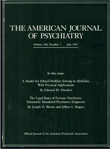Association of subjective memory complaints with subsequent cognitive decline in community-dwelling elderly individuals with baseline cognitive impairment
Abstract
OBJECTIVE: The validity of subjective memory complaints has been questioned by clinical studies that have shown little relationship between memory complaints and objective memory performance. These studies often have been cross-sectional in design, have excluded individuals with cognitive impairment, or have lacked a comparison group. The authors conducted a study that attempted to avoid these limitations. METHOD: Memory complaints of 364 nondemented, community- dwelling elderly individuals were recorded as present or absent at the baseline evaluation. After 1 year, 169 subjects were reevaluated. Standardized neurologic and neuropsychological evaluations were used at each assessment to classify subjects as normal or cognitively impaired. RESULTS: At baseline, 31% of the normal subjects and 47% of those with cognitive impairment had memory complaints. Subjects with memory complaints had higher Hamilton depression scale scores than subjects without memory complaints but equivalent scores on a measure of total recall. At follow-up, multivariate analyses showed that subjects with baseline memory complaints had significantly greater decline in memory and cognition than subjects without memory complaints. Secondary analyses showed this effect to be confined to subjects with baseline cognitive impairment. CONCLUSIONS: Memory complaints may lack validity in subjects with normal cognition, but in nondemented individuals with cognitive impairment, memory complaints may predict subsequent cognitive decline.



